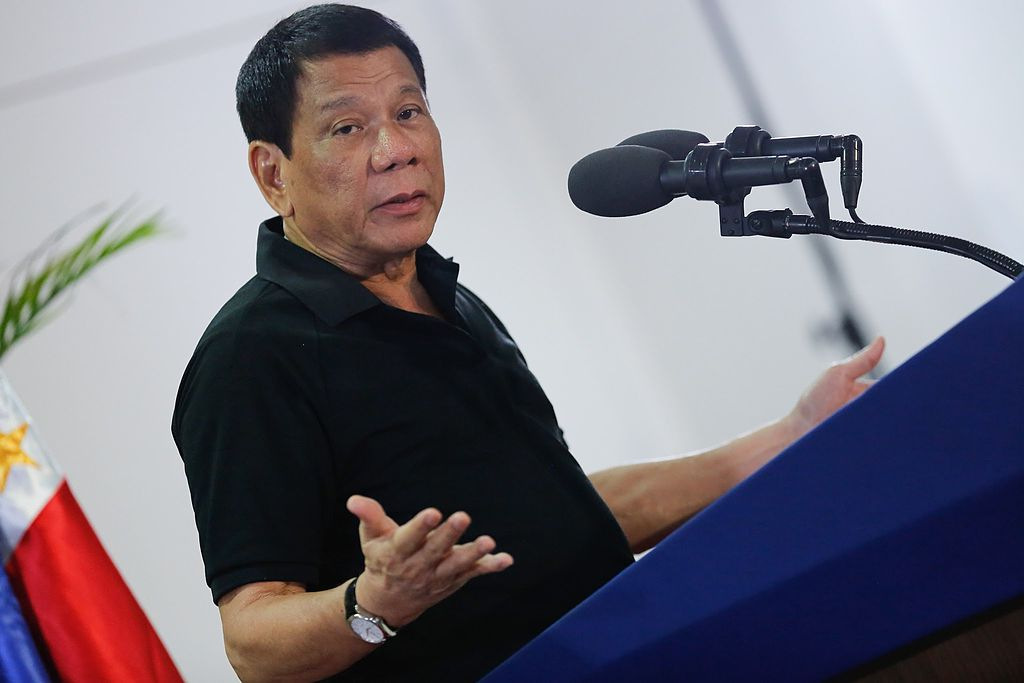MANILA, Philippines (ViaNews) – With a president that changes his mind quite too often, a looming dictatorship in the Philippines is likely in the offing.
The mere mention of “dictatorship” and “martial law” is considered obnoxious in the Philippine political landscape. After all, the conjugal dictatorship and martial law rule of former Philippine President Ferdinand Marcos and wife Imelda, which lasted for two decades until they were toppled by a people’s uprising in 1986, are considered as one of the darkest periods in the country’s history, marred with thousands of human rights violations and corruption allegations, both of which remain unresolved to this day.
Still, the current president holds no qualm about openly expressing his admiration to the former strongman, whose remains he allowed to be buried in the country’s heroes’ cemetery despite receiving strong criticisms, most especially from victims of human rights violations.
However, the looming return of a one-man rule in the Philippines goes beyond President Duterte’s apparent high regard to the Marcoses. Looking into his words, how this is translated these into a policy, and how such is being carried out on the ground — dictatorship may indeed be just around the corner.
‘Dictatorship’ and martial law rule pronouncement
During the election campaign, then Davao City Mayor Duterte was never modest about him being a dictator and once said, “I am a dictator? Yes, it is true. If you do not like it then don’t vote for me.”
Elections came and the tough-talking mayor won the hearts of the many with a platform that revolved and boiled down to one point – the elimination of illegal drugs in the country. Soon after his victory and the eventual proclamation, his cabinet secretaries went to town hoping to secure an “emergency power” for the newly-elected president. This was geared to supposedly put an end to the infamous heavy traffic in Metro Manila.
Months later, President Duterte said he was no longer eager to seek the “emergency power,” and that he will not insist on it if lawmakers “do not feel safe or comfortable with my cabinet” due to possible corruption allegations that may arise as a result despite half of the senators pledging support to grant him such.
Then, he began on hinting the public on the possibility of declaring martial law in the Philippines. But it was only when armed attackers, who claim to have support and connection to the infamous ISIS, attacked the city of Marawi that Duterte had the opportunity to declare martial law last May 23, 2017, in the entire Mindanao, the southern part of the Philippines, despite strong criticisms from human rights advocates as such may result to gross human rights violations.
As of this writing, the martial law rule in the whole of Mindanao has yet to be lifted, despite Duterte’s pronouncement that Marawi City is finally free from ISIS attackers.
Duterte’s threat to declare martial law would almost always crop up whenever he has public speaking engagements. Just last month, the Philippine president threatened anew to declare martial law nationwide, citing the so-called rebellious acts being committed by the New People’s Army (NPA), the armed wing of the Communist Party of the Philippines (CPP).
He then virtually terminated the peace negotiations with the National Democratic Front of the Philippines (NDFP) and consequently branded the CPP and the NPA as terrorist groups.
Duterte had also threatened to declare a “revolutionary government” amid what he referred to as “destabilization plot” against him. Critics, however, argued that dissent does not necessarily translate to a plan to overthrow the president.
And for the nth time, Duterte changed his mind on the revolutionary government. He said in Filipino that it is not “in his nature” to become a dictator.
Attacks against the judiciary
More than his pronouncements, critics have also been attributing the recent attacks to oust the Chief Justice of the Supreme Court and the Ombudsman from office so that Duterte may be able to have full control over the government.
In October this year, Duterte accused Chief Justice Maria Lourdes Sereno and Ombudsman Conchita Carpio-Morales of conspiring with those who want him removed from the presidency and threatened to have impeachment charges filed against them, adding that “they did it first. I did not start this ruckus. I was quiet.”
As of now, Sereno is facing impeachment charges before the House of Representatives where President Duterte is said to have a “supermajority.” At one point, the lawyer who filed the impeachment charges told lawmakers that he “cannot remember” where he got the information, which served as the basis to file the charges.
There is still no impeachment charges filed against Ombudsman, whom Duterte accused of falsifying evidence against him, referring to the reported Anti-Money Laundering Council documents that are in the hands of the Office of the Ombudsman.
Constitutional change
In all of these, the most obvious sign that a dictatorship rule is indeed in the offing in the Philippines is the Resolution of Both Houses No. 8, which seeks to amend the Constitution and to shift to a federal form of government that is currently filed before the House of Representatives.
In a recent speech, Duterte assured the public that the new constitution will not pave for his dictatorship over the country.
“In the event that Congress comes up with an anti-corruption Constitution, I will step down at the end of the year. That is a commitment, a guarantee. Make me a Constitution that would do away with a long-suffering corruption-ridden country and I would be willing to just step out so you won’t be afraid that I am just after being a dictator,” Duterte said in a news report.
However, the former progressive lawmaker and long-time human rights lawyer Neri Colmenares warned of the dangers that the proposed draft of the new Constitution, making Duterte a “very powerful president.”
The Resolution of Both Houses No. 8 provides the abolition of the Congress, which will grant Duterte legislative powers to issue presidential decrees and laws, similar to the days of the former strongman Marcos. Colmenares said Duterte will also be allowed to appoint and re-appoint all justices and judges, which, in essence, will overhaul the entire judiciary system in the country.
“This is one of the most dangerous Cha-cha (charter change) ever. We should oppose this as we will oppose the threatened revolutionary government,” Colmenares said.
So what?
The volatile and unpredictable political conditions under the Duterte administration put human rights advocates on their toes with at least 10 politically-motivated killings in a span of two days, Dec. 3 to 4, while the drug-related killings continue to escalate every day.
The Philippine military is also accused of carrying out food blockade to the displaced indigenous peoples in Lianga, Surigao del Sur, where a martial law rule is still in effect.
Filipino activists are gearing for a big protest action on Dec. 10, 2017, the International Human Rights Day to “oppose the Duterte regime’s escalating fascist attacks against the people and its imposition of a full-blown dictatorship,” according to rights group Karapatan secretary general Cristina Palabay.
For now, the pressing issue on whether Duterte will change his mind or not is out of the question. The only thing that remains uncertain now is whether or not it will be for the better or worse.




